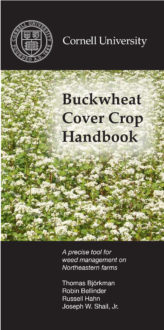Buckwheat has been used to suppress weeds on Northeastern farms for 400 years. On modern farms we have different tools, a different market, and different economic constraints; so buckwheat will be useful in different situations. In this brochure, developed by Cornell University, the authors describe situations where buckwheat has high value on 21st century farms because it controls weeds economically and in a way that adds significantly to the other weed control practices that are available.
This handbook is based on extensive grower surveys, gathering knowledge held by successful growers, material printed in obscure old extension and farm publications, as well as original research to answer new questions. The instructions have been tested by cooperating farmers to make sure they work.
Want more information? See the related SARE grant:
This material is based upon work that is supported by the National Institute of Food and Agriculture, U.S. Department of Agriculture through the Sustainable Agriculture Research and Education (SARE) program. Any opinions, findings, conclusions, or recommendations expressed in this publication are those of the author(s) and should not be construed to represent any official USDA or U.S. Government determination or policy.
